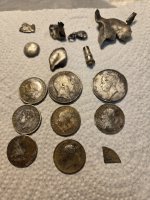Satori
Full Member
Editor: Steve Lombardi, Attorney at Law
Firm: The Lombardi Law Firm
January 12, 2008
By Steve Lombardi
TrackBack (0)
Category: Trial Practice
How to classify the property is a fact question. That means what the trial court decides it is to be classified as will probably not be disturbed on appeal unless there is no way, legally or factually to reason what the trial court did. In other words it's an uphill battle if you lose the fact issues in the trial court.
In Iowa the lost property statute doesn't abrogate the common law classifications. Unless the property is "lost" by common law definition, then the lost property statue won't apply.
Of the four classifications let's exclude those that the money can't be. It's not going to be considered as treasure trove because it's not old enough and the owner might be found. Treasure trove consists of coins or currency concealed by the owner. It includes an element of antiquity. To be classified as treasure trove, the property must have been hidden or concealed for such a length of time that the owner is probably dead or undiscoverable. The owner isn't likely to be dead. The money was found in August 1992 and the oldest currency is from the 1950s. That's only a period of 42 years. It's not like a treasure gold coins found in a treasure chest at the bottom of the sea stamped from the early 1600s. So let's exclude it from treasure trove.
Firm: The Lombardi Law Firm
January 12, 2008
By Steve Lombardi
TrackBack (0)
Category: Trial Practice
How to classify the property is a fact question. That means what the trial court decides it is to be classified as will probably not be disturbed on appeal unless there is no way, legally or factually to reason what the trial court did. In other words it's an uphill battle if you lose the fact issues in the trial court.
In Iowa the lost property statute doesn't abrogate the common law classifications. Unless the property is "lost" by common law definition, then the lost property statue won't apply.
Of the four classifications let's exclude those that the money can't be. It's not going to be considered as treasure trove because it's not old enough and the owner might be found. Treasure trove consists of coins or currency concealed by the owner. It includes an element of antiquity. To be classified as treasure trove, the property must have been hidden or concealed for such a length of time that the owner is probably dead or undiscoverable. The owner isn't likely to be dead. The money was found in August 1992 and the oldest currency is from the 1950s. That's only a period of 42 years. It's not like a treasure gold coins found in a treasure chest at the bottom of the sea stamped from the early 1600s. So let's exclude it from treasure trove.




